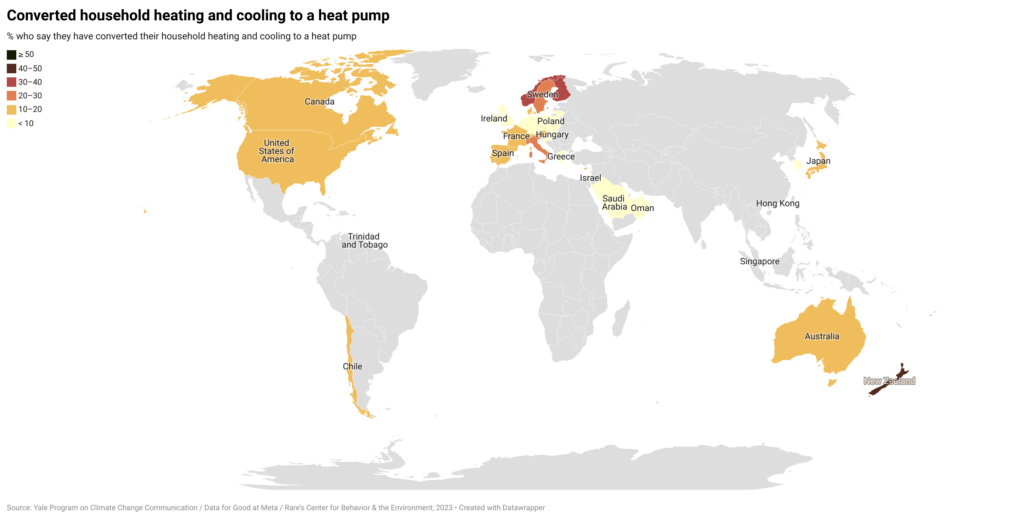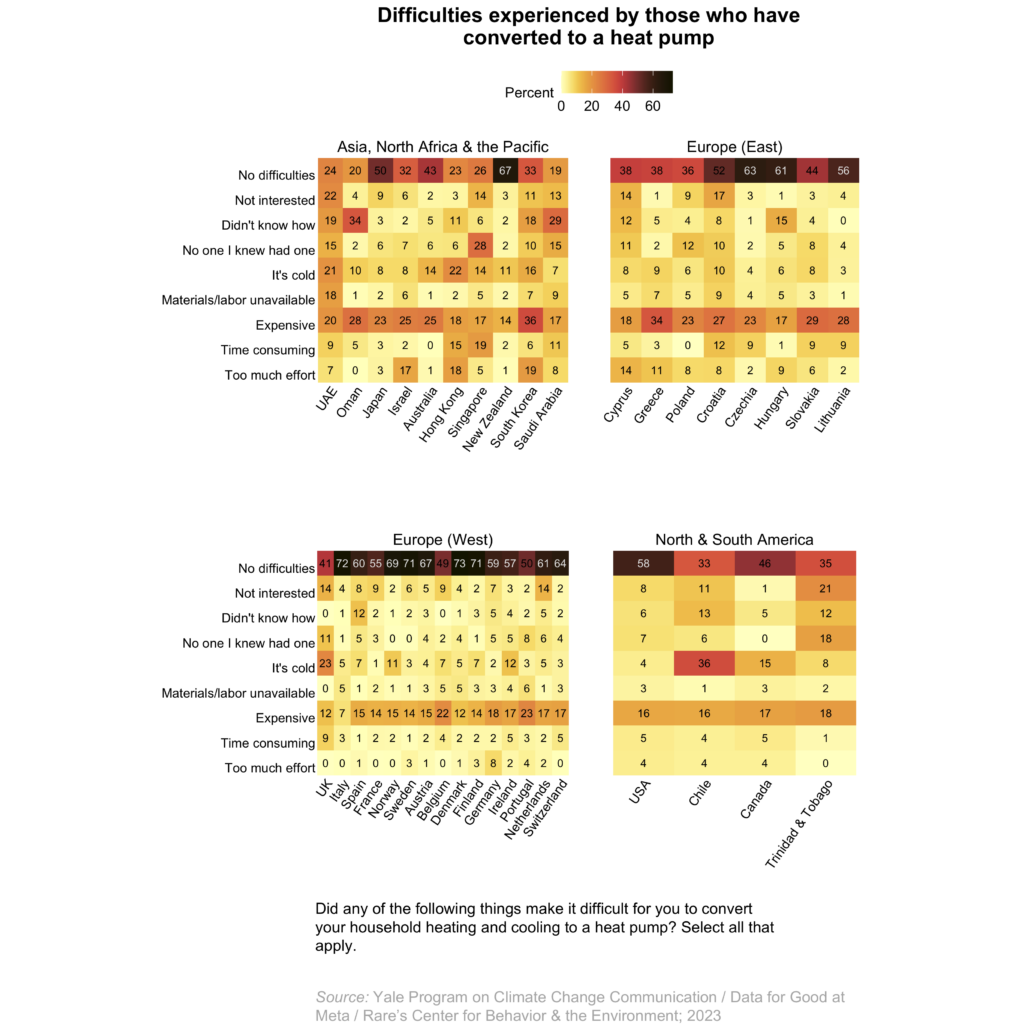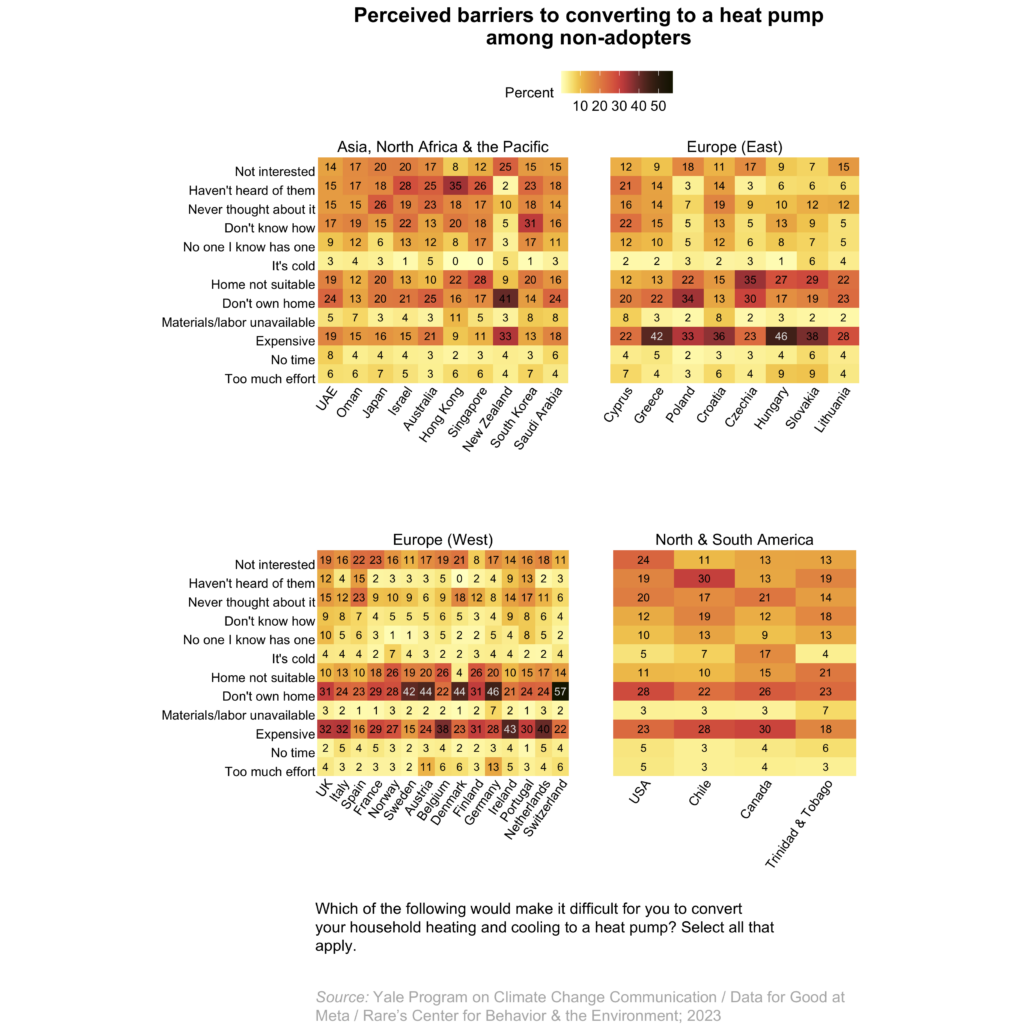Report · Jun 6, 2024
International Public Opinion on Climate Change: Household Climate Actions – Adoption and Barriers, 2023
By Anthony Leiserowitz, Jennifer Carman, Emily Goddard, Erik Thulin, Emily Wood, Marija Verner, Natalia Ordaz Reynoso, Seth Rosenthal, Jennifer Marlon and Nicole Buttermore
Filed under: Behaviors & Actions and Beliefs & Attitudes
5. Heat Pumps
5.1. Relatively few respondents overall said they have converted their household to a heat pump, though adoption was high in a few countries.
Relatively few respondents across all surveyed countries and territories (12%, see section 1.1) said they had converted their household heating and cooling to a heat pump (a device that uses electricity more efficiently to heat and cool homes by transferring heat from one place to another). However, reported adoption of heat pumps varied widely by country and territory, and ranged from 45% in New Zealand to 3% in Israel and the United Kingdom. Other countries with higher reported rates of adoption of heat pumps were Norway (38%), Finland (32%), and Sweden (27%).
5.2. Many respondents who converted their home to a heat pump said they faced no difficulties doing so.
Among respondents who said they converted their household heating and cooling to a heat pump, majorities in 20 out of 37 countries and territories said they did not have any difficulties doing so. Respondents in Northern and Western Europe were most likely to say they had not had difficulties, with the largest percentages in Denmark (73%), Italy (72%), and Sweden and Finland (both 71%). Respondents who converted their home to a heat pump were least likely to say they did not face difficulties in Hong Kong (23%), Oman (20%), and Saudi Arabia (19%), meaning that they were most likely to say they faced some difficulties.
However, other respondents who had adopted this behavior did report facing some difficulties. South Korea (36%), Greece (34%), and Slovakia (29%) had the highest percentages of respondents who said it was expensive.Respondents were allowed to select more than one answer to this question, unless they selected “I didn’t have any difficulties.” Oman (34%), Saudi Arabia (29%), and the United Arab Emirates (19%) had the highest percentages who said they did not know how. Chile (36%), the United Kingdom (23%), and Hong Kong (22%) had the highest percentages who said it is cold where they live. Singapore (28%), Trinidad & Tobago (18%), and the United Arab Emirates and Saudi Arabia (both 15%) had the highest percentages who said that no one they knew had a heat pump. The United Arab Emirates (22%), Trinidad & Tobago (21%), and Croatia (17%) had the highest percentages who said they were not interested. South Korea (19%), Hong Kong (18%), and Israel (17%) had the highest percentages who said they thought it would take too much effort. Singapore (19%), Hong Kong (15%), and Croatia (12%) had the highest percentages who said it took a lot of time. Finally, respondents in the United Arab Emirates (18%) and Saudi Arabia and Croatia (both 9%) said heat pumps, or contractors to install them, were not available.
5.3. Among those who had not converted to a heat pump, the most common barriers were not owning their home or conversion being too expensive.
Among those who said they had not converted their household heating and cooling to a heat pump, the most common reasons it would be difficult to do so (i.e., “barriers”) were that they do not own their home, or that it is too expensive.Respondents were allowed to select more than one answer to this question. Many respondents also said that their home is not suitable, or that they have never heard of heat pumps.
Respondents in Switzerland (57%), Germany (46%), and Austria and Denmark (both 44%) were most likely to say that they do not own their home. Respondents in Hungary (46%), Ireland (43%), and Greece (42%) were most likely to say it is too expensive. Czechia (35%), Slovakia (29%), and Singapore (28%) had the largest percentages of respondents who said their home was not suitable. Hong Kong (35%), Chile (30%), and Israel (28%) had the largest percentages who said they had never heard of heat pumps.
Among other barriers to converting to a heat pump, respondents in South Korea (31%), and Israel and Cyprus (both 22%) had the largest percentages of respondents who said they didn’t know how to convert their house to a heat pump. Japan (26%), and Australia and Spain (both 23%) had the highest percentages who said they had never thought about getting a heat pump. New Zealand (25%), the United States (24%), and France (23%) had the highest percentages who said that they were not interested. Singapore and South Korea (both 17%) had the highest percentages who said that no one they know has a heat pump. Canada (17%), and Norway and Chile (both 7%) had the highest percentages who said that it’s too cold where they live. Germany (13%), Austria (11%), and Hungary and Slovakia (both 9%) had the highest percentages who said that it is too much effort. Hong Kong (11%), and South Korea, Saudi Arabia, Cyprus, and Croatia (all 8%) had the highest percentages who said that the materials or contractors to install heat pumps are not available. Finally, the United Arab Emirates (8%), and Saudi Arabia, Slovakia, and Trinidad & Tobago (all 6%) had the highest percentages who said they had no time.


